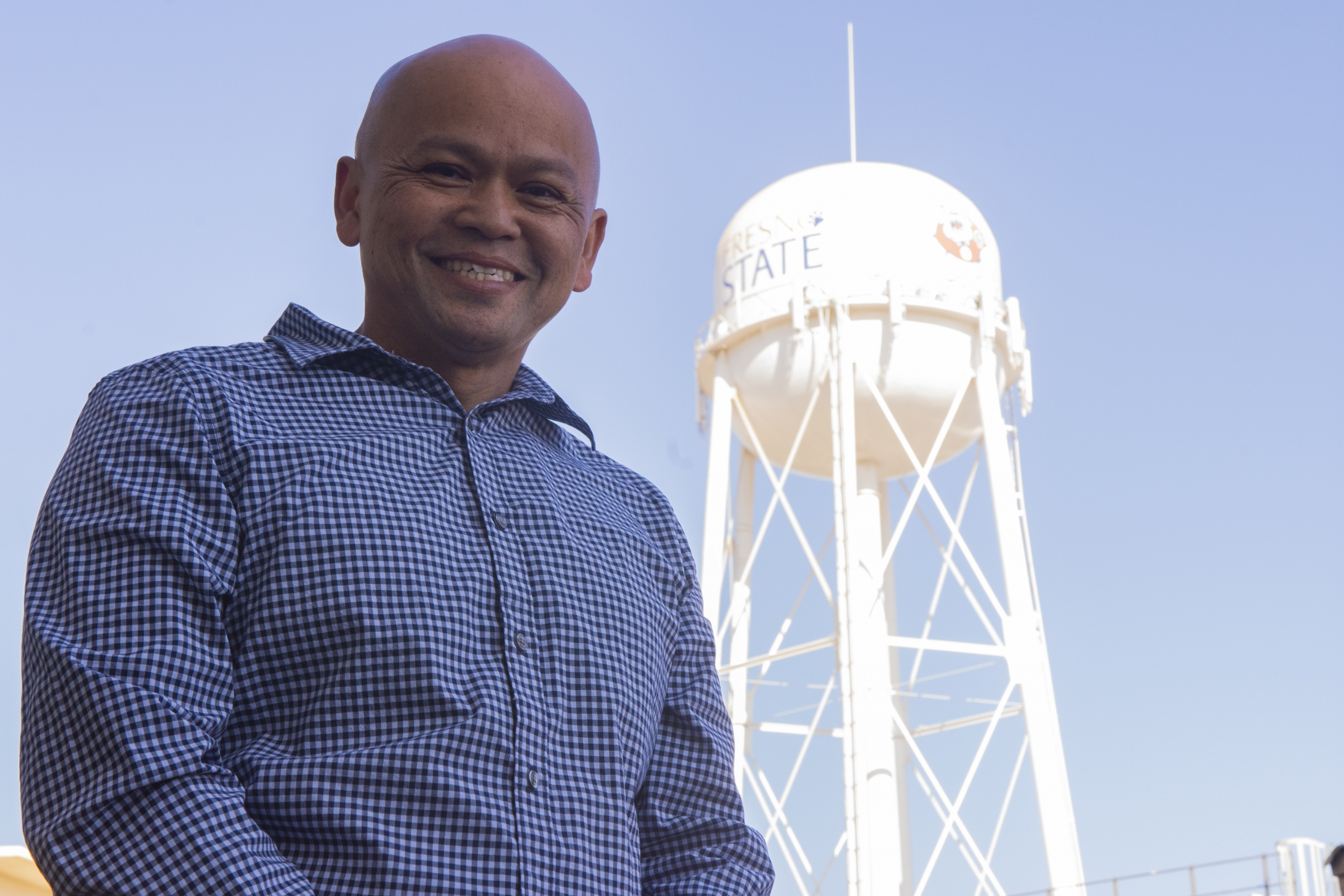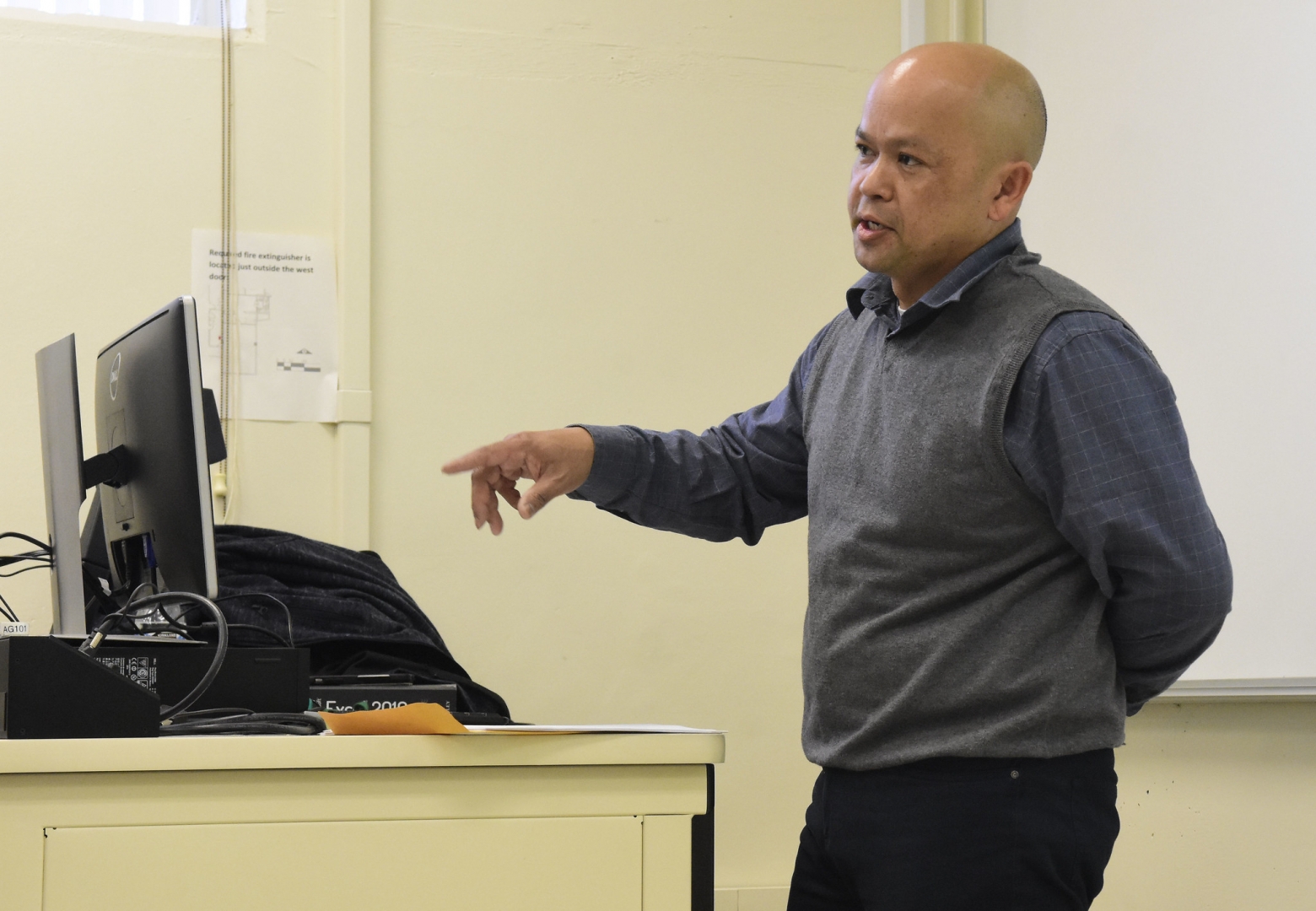‘Killing Fields’ Survivor Finds Future in Food

Neil Tung has always felt a connection to food.
In his childhood, the relationship was born of scarcity; as a young adult, he learned to grow crops; and today, his passion is rooted in a successful career delivering ingredients and teaching agriculture business to college students.
For Tung (Agricultural Science, ’98), the stability in his job at Rob Ross Foods and the transformational learning environment of Fresno State are worlds away from the uncertainty, brutality, and violence that marked his youth.
Born in Cambodia in late 1974, Tung was just four months old at the beginning of the Pol Pot regime, a time when millions of Cambodians died at the hands of the national political party, the Khmer Rouge, from starvation, execution, or disease.
“Watching the movie The Killing Fields,” said Tung, the youngest of nine children, “gives you a sense of what my early childhood was like.”
His family was separated every day— an elderly woman from the village watched over him and other young siblings while his parents planted rice or picked corn in fields and his older siblings were forced to work in labor camps.

Malnutrition was rampant throughout the country, as the paltry amount of food the Pol Pot regime provided was insufficient. Tung’s family made the most of the natural resources around them, however, establishing a home garden and gathering food however they could.
“To this day I still remember my older sister wading into the pond in front of our house looking for water snails,” he said.
After finding a handful of the gastropods, she cooked them in a small tin can over a fire and shared them. After the meal, they hid the dishes from the soldiers to conceal the fact they were supplementing their government-issued food supply. Some nights Tung’s father returned from work with fish or field rats he captured on the way home to eat. When one of Tung’s older brothers was caught stealing food from the regime, the act cost him his life.
The Pol Pot regime fell in early 1979, and the Tungs fled to Thailand for safety as Vietnam took over Cambodia. Day and night, they stealthily made their way to the border, evading soldiers and passing those who perished in their attempt to escape. After weeks of walking, Tung, just four years old, and his family settled into a Thailand refugee camp.
They dreamed of joining other family members who had already immigrated to the United States. After months of his father petitioning to leave the refugee camp, the Tungs were accepted for resettlement in the United States. In early 1981, Tung and his family flew to San Francisco International Airport, then endured a bus ride to Stockton, where Tung’s sister was already living, and joined an ever-growing Cambodian community.
When it was time for Tung and his siblings to register for schools, his parents listed them as two years younger than they actually were, so the children would have the opportunity for more education. Gradually, he and his siblings fell into the ways of life as ordinary American children—science projects, fast food, and hanging out with friends.

(Photo courtesy of Neil Tung)
“Everyone in the family was glad to come to America,” Tung said.
When a guest speaker visited Tung’s junior high school, recruiting students for a Future Farmers of America agricultural science class, he enrolled as an elective. His interest grew in high school, and Tung became involved with FFA however he could. From growing chili peppers at the high school farm to attending regional events and acting as FFA treasurer, he kept busy, always learning. More importantly, he really enjoyed his studies, especially plant and animal science.
“Growing up, my parents always told me that education was very important,” he said. “My goals in high school were to attend college, graduate, and find a good-paying job.”
In fall 1994, he began attending Chico State and started working at University Farm the next semester. From learning to grow crops in the greenhouse and milking cows early in the morning to driving farm equipment, the hands-on skills would shape his life and direct his career.
“Working with the staff at the University Farm helped me understand personal management, and to not be afraid to take a leadership role,” he said. “For example, jumping on a task and completing it, time management, and overall day-to-day business operations.”
Unsurprised by Tung’s career success, professor and University Farm administrator David Daley remembers his wide-ranging interests in agriculture.

(Photo courtesy of Geoff Thurner)
“Neil was an engaged student who understood the rapidly evolving field of agriculture—the science, the technology and the business aspects,” Daley said. “He loved utilizing the University Farm ‘living laboratory’ as a model to increase his knowledge and skills. His love of participating in engaged, experiential learning made him one of those students you don’t forget.”
After graduation, Tung leveraged his love for food and agriculture into a rewarding career at Robb Ross Foods, a Fresno-based food distributor that delivers delectables and ingredients to bakeries and cafes up and down Highway 99. Over the last 17 years, he has done tasks ranging from insurance and sales calls to driving semitrailers for deliveries and tending day-to-day financials.
He is grateful for his time at Rob Ross, especially because his employer was instrumental in helping him earn his Master of Business Administration from Fresno State in 2009 by helping to pay for his schooling. And because of his hard work, the company allows him to teach a few days a week at Fresno State, where he has been a part-time instructor for six years.
“The owners are great to work with and they are very family oriented,” said Tung. “There aren’t a lot of companies like them.”
He also expresses appreciation for his time at Chico State, where, he said, his work inside the classroom and at the University Farm built habits that put him on the path to success.
Tung sees himself reflected in his agricultural business students at Fresno State. Like him, many are first-generation, so he shares his life experiences as an example of what is possible through hard work and determination. He pushes his students to finish school and earn their degrees.
“At the start of semester, I tell them, ‘Hey, this is where I came from and I was able to get to where I am through hard work,’” Tung said. “I hope my students use me as some kind of mentor, saying ‘This guy came here with nothing, and he’s successful.’ That’s what I hope all of my students take away when I teach.”


